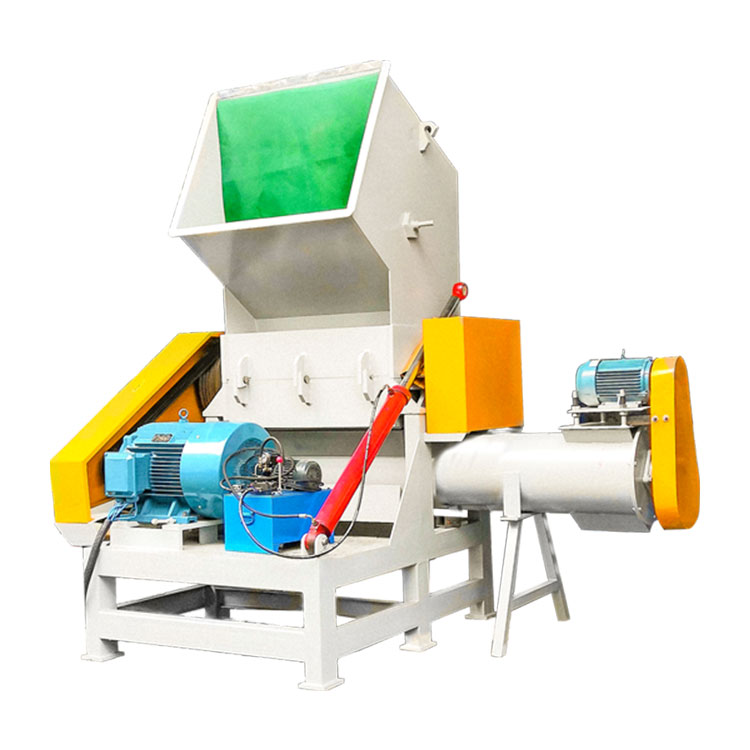Plastic Crusher: The Essential Machine for Recycling and Waste Management
2025-01-23
In today’s world, environmental sustainability is more important than ever. As plastic waste continues to accumulate at alarming rates, industries and communities are looking for ways to reduce, reuse, and recycle plastic materials. One of the key solutions in plastic recycling is the plastic crusher. This powerful machine helps break down plastic waste into manageable pieces, making it easier to recycle and repurpose the materials.
In this blog, we’ll take a closer look at plastic crushers, their benefits, how they work, and their various applications in the recycling industry.
What is a Plastic Crusher?
A plastic crusher is a machine designed to crush plastic materials into smaller, more manageable pieces. This process is a critical part of the recycling chain, as it allows large plastic items—such as plastic bottles, containers, films, and other packaging materials—to be reduced in size. Once the plastic is crushed, it can be processed further for recycling or repurposing.
Plastic crushers come in various shapes and sizes, from small machines for household use to large, industrial-grade crushers that handle vast quantities of plastic waste. Regardless of the size, the primary function of a plastic crusher remains the same: to break down plastic waste efficiently and effectively.
How Does a Plastic Crusher Work?
Plastic crushers typically work by feeding plastic waste into a hopper, where it is then processed by a set of rotating blades or knives. These blades are designed to cut or crush the plastic into small fragments or granules. The resulting material can then be collected for further processing or recycling.
There are several types of plastic crushers, each designed for specific applications:
1. Single Shaft Crushers: These crushers use a single rotating shaft with blades to crush plastic materials. They are best suited for processing smaller quantities of plastic waste and are commonly used in industries like packaging and small-scale recycling operations.
2. Two Shaft Crushers: These machines use two rotating shafts with blades to cut through plastic materials. They are more efficient than single-shaft crushers and are ideal for processing larger volumes of plastic waste. Two-shaft crushers are commonly used in industrial recycling plants.
3. Granulators: Granulators are a type of plastic crusher designed to produce smaller, uniform-sized plastic pieces (or granules). These machines use a combination of rotary blades and fixed blades to shred plastic waste into consistent sizes. Granulators are often used in the recycling of plastic packaging, automotive parts, and electronics.
4. Crusher Shredders: These machines combine the features of a crusher and a shredder. They can handle a wide range of plastic materials and are ideal for large-scale recycling operations that need to process high volumes of plastic waste efficiently.
5. Wet Crushers: Wet crushers are used for processing wet or sticky plastics. They use a water-based system to help break down the plastic and prevent the material from clogging the machine.
Benefits of Using a Plastic Crusher
The use of a plastic crusher in the recycling process offers several key benefits:
1. Environmental Impact Reduction: By reducing plastic waste into smaller, more manageable pieces, plastic crushers help facilitate the recycling process. This enables plastic to be repurposed into new products, reducing the amount of plastic that ends up in landfills or the ocean.
2. Energy Efficiency: Modern plastic crushers are designed to be energy-efficient, requiring less power to crush large amounts of plastic compared to other waste processing methods. This can lead to lower operational costs for businesses and recycling plants.
3. Cost Savings: Recycling plastic materials through crushing can significantly reduce the need for new raw materials. By repurposing plastic waste into useful products, industries can save money on purchasing virgin materials, while also reducing disposal costs.
4. Increased Recycling Efficiency: Plastic crushers make it easier to separate plastic waste into smaller, uniform pieces, which improves the efficiency of the recycling process. This allows for more effective sorting, washing, and processing of plastic waste into new products.
5. Versatility: Plastic crushers are versatile machines that can handle a wide range of plastic materials, from bottles and containers to films and packaging materials. This versatility makes them suitable for use in various industries, including packaging, automotive, and electronics.
6. Improved Safety: When plastic waste is not properly managed, it can pose risks to workers and the environment. By crushing plastic waste before it is disposed of or recycled, plastic crushers help minimize safety hazards and reduce the potential for injury or accidents in the workplace.
Applications of Plastic Crushers
Plastic crushers are used in various industries for recycling and waste management. Some common applications include:
1. Packaging Industry: The packaging industry produces a vast amount of plastic waste in the form of bottles, films, and containers. Plastic crushers are used to break down this waste, making it easier to recycle and reuse for manufacturing new packaging materials.
2. Automotive Industry: The automotive industry generates significant plastic waste, including bumpers, dashboards, and interior components. Plastic crushers are used to process these materials and convert them into recycled plastic that can be used in the production of new car parts.
3. Electronics Industry: In the electronics sector, plastic crushers are used to break down old electronics, such as computer housings, TV parts, and phone components. The crushed plastic can then be recycled to create new electronic devices or plastic components.
4. Construction Industry: Plastic crushers are used to process plastic waste generated during construction projects, such as plastic pipes, insulation materials, and packaging. This helps reduce the environmental impact of construction activities and contributes to more sustainable building practices.
5. Household and Commercial Waste: Plastic crushers are also used in waste management facilities to process household and commercial plastic waste, such as bottles, containers, and packaging materials. By breaking down these materials, plastic crushers make it easier to separate and recycle plastics, diverting waste from landfills.
How to Choose the Right Plastic Crusher
When selecting a plastic crusher for your business or recycling facility, it’s essential to consider the following factors:
1. Type of Plastic Waste: Different types of plastic require different crushers. For example, soft plastic films might require a granulator, while rigid plastic containers may be better suited for a single or two-shaft crusher.
2. Processing Capacity: The processing capacity of the crusher should align with the amount of plastic waste you need to handle daily. Larger-scale operations will need crushers with higher processing capacities to meet their demands.
3. Energy Efficiency: Consider the energy consumption of the machine. Look for models that are designed to be energy-efficient to minimize operating costs and reduce the carbon footprint of your business.
4. Maintenance and Durability: Ensure that the plastic crusher you choose is easy to maintain and built to last. High-quality machines will require fewer repairs and have a longer operational lifespan.
5. Size and Space: Make sure the crusher fits within the available space in your facility. Some models are compact and can fit into smaller areas, while others may require more room for installation.
Conclusion: The Future of Plastic Recycling
As the world faces growing concerns about plastic waste and its environmental impact, the role of plastic crushers in recycling and waste management becomes even more critical. By breaking down plastic waste into smaller, manageable pieces, these machines help streamline the recycling process, making it easier to repurpose plastic materials and reduce waste.
Incorporating plastic crushers into your recycling operations not only benefits the environment but also supports cost-effective, sustainable practices in industries across the globe. Whether you're working in packaging, automotive, or electronics, plastic crushers are a smart investment in the future of waste management and recycling.



